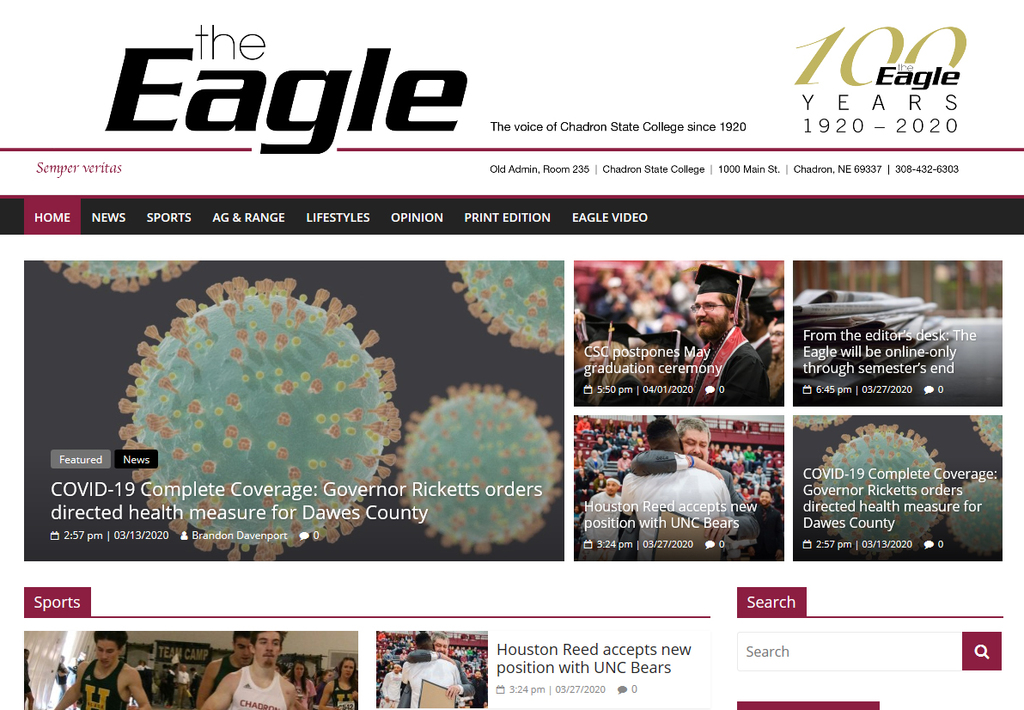CSC student newspaper following COVID-19 closely, print editions canceled

CHADRON – When Chadron State College President Randy Rhine sent a March 17 email to CSC students, faculty, and staff that all courses would move to remote delivery in response to the COVID-19 pandemic, Brandon Davenport, editor of The Eagle, CSC’s student newspaper, was ready.
“I had been paying close attention as things started to close around the nation,” said Davenport, who posted a story about the change on the paper’s website, www.csceagle.com, before 11 a.m. that day. “I was keeping up with the national story. That day you could feel the gears were moving. I was well prepared as soon as I got the email.”
That’s the type of journalistic instinct the paper’s adviser, CSC communications instructor Mike Kennedy, said has won The Eagle top awards in the annual Nebraska Collegiate Media Association (now the Northern Plains Collegiate Media Association) newspaper competition the past several years.
“I have had many staffs. They have all been good in different ways,” Kennedy said. “This particular staff has raised the bar to a higher level and has exhibited that throughout this conflict.”
The Eagle, which will celebrate its 100th anniversary of publication this fall, typically publishes 14 print issues a semester, for which it earns a modest amount of advertising revenue. Other funding comes from student activity fees allocated by the CSC Student Senate. While many of its staff members are majoring in communication studies, others come from a variety of educational disciplines.
Keeping students informed about important developments like the COVID-19 response is part of The Eagle’s mission, said Davenport, who is finishing his degree, and worked for a couple years as a writer and editor for The Chadron Record. “Our first function is to serve the student body,” he said. “My first thought (after receiving Rhine’s email) was ‘This is information students need. There were procedures students who were traveling needed to do. Not everyone will read the press release or email.’”
Davenport said he has done most of The Eagle’s COVID-19 reporting so far, but other staff members have been busy behind the scenes, even as they adjust to the online-only class format.
“Everyone is working on something,” he said.
Holding virtual staff meetings and gathering information exclusively through electronic connections are among the challenges of the pandemic crisis for fledgling reporters, Davenport said, but the situation also holds valuable lessons.
“As journalists we have to work through crisis,” he said. “It’s a good lesson in having to work harder to find all the stories, to conduct interviews by phone, to think what are we going to do for visual images with no one on campus.”
“It’s become harder to reach out to people for interviews, and have a conversation about what I’m writing about,” said Aubrie Lawrence, a freshman reporter from Alliance. “Now we have to do everything via email or phone call. It’s also hard being disconnected from the rest of the staff.”
With campus nearly empty, and all sporting events canceled, The Eagle’s reporters will focus more on feature stories, such as how students are handling the change to remote delivery of all classes, Davenport said.
The Eagle also faces financial challenges from the loss of advertising revenue brought in by its print edition, which has been discontinued for the remainder of the semester, Kennedy said. But the decision to publish entirely online wasn’t difficult, since few students remain on campus, where the printed copies are distributed for free, he said.
Suspending the print edition doesn’t change The Eagle’s purpose, Lawrence said.
“We want to make sure that CSC students, whether at home or on campus, are still getting the news that they need and are being updated on the current situation,” she said. “This time will give us all a chance to focus on key stories that may take longer.”
Though he helped make the decision to temporarily suspend The Eagle’s printed edition, Davenport said he believes in the future of print journalism.
“I don’t think we will ever kill print news, especially in small communities,” he said.
And Davenport, who intends to pursue a career in journalism after graduation, said his experience working for a newspaper prepared him for the responsibility of reporting on a situation like the COVID-19 pandemic.
“As a journalist, when these crises happen, that’s when we go to work,” he said.
Category: Campus News, Student Clubs & Organizations
